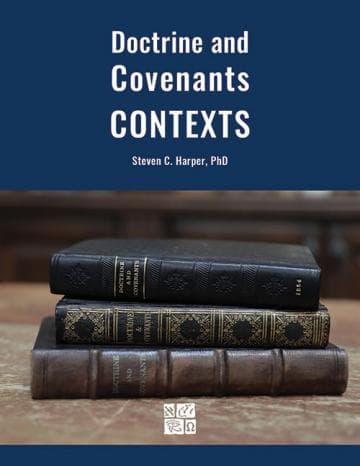Book
136 Chapters

The leaders of the Church in Missouri grew troubled. Saints were gathering there by the hundreds. Relatively few of them were obeying the law of consecration when they arrived. “Have you all fulfilled the law of the church,” William Phelps wrote to them in the Church’s newspaper, “which saith: Behold thou shalt consecrate all thy properties, that which thou hast, unto me, with a covenant and a deed which cannot be broken?”[1] (See section 42.)
In Ohio, Joseph learned by “the still small voice” that leaders in Missouri were wondering what to do. He sought and received a revealed answer, section 85, which he sent to them.[2] It clarifies the duty of the Lord’s clerk to keep a history of righteousness and unrighteousness in Zion, including accurate records “of all those who consecrate properties, and receive inheritances legally from the bishop.” Those that do not receive their inheritance by living the law of consecration are to be excluded from the Church record referred to as the “book of the law of God.”
Verse 7 prophesies that the Lord will send someone to arrange inheritances for those whose names are recorded in the book, but those who are not in the book will receive no inheritance in Zion. Verse 8 prophesies that those who steady the ark (go beyond their assigned role in building Zion) will be smitten.
Joseph purchased his first journal on the very day this revelation was given “for the purpose,” he wrote, “to keep a minute account of all things that come under my observation.”[3] At about this same time, Joseph began writing his history, recording his letters, and minutes of Church council meetings. He knew, as John the Revelator had prophesied, that mankind would be judged by records of their works kept on earth (Revelation 20:12; D&C 128:6–8), and Joseph tried to document his own “manner of life” (D&C 85:2).
Later, in 1841, Joseph began another journal, the “Book of the Law of the Lord,” a title he derived from D&C 85. Joseph appointed Willard Richards as “Recorder for the Temple, and the Scribe for the private office of the President.” Willard became what section 82 calls the “Lord’s clerk,” filling the duties described in the revelation. He recorded historical entries and donations in the Book of the Law of the Lord.[4] In 1842, while preparing to leave for the East, Richards gave the book to William Clayton, whom Joseph appointed as Temple Recorder, with a commission to fulfill the duties named in section 82.[5]
These recorders carefully kept track of consecration. They recorded the deeds and donations of those who freely offered their whole souls to the Lord’s work. Joseph recorded a tribute to his wife Emma, to Bishop Newel Whitney, to his brother Hyrum and many others. “The names of the faithful are what I wish to record in this place.” He recorded “the virtues and the good qualifications and characteristics of the faithful few,” as he called them, but also noted that “there are a numerous host of faithful souls, whose names I could wish to record in the Book of the Law of the Lord.”[6]
I’m sometimes asked when the Lord will require us to live the law of consecration. The answer is never. It never has been coercive and never will be. Section 85 clarifies that Church leaders should simply keep track of who consecrates but not encroach on individual agency to obey or disobey. The Lord will judge as he deems best. The law is quietly kept by many people, and their names are recorded in appropriate places. The faithful whose names and deeds are documented will receive inheritances in Zion. Those “whose names are not found written in the book of the law . . . shall not find an inheritance among the saints of the Most High” (D&C 82:7, 11).
[1] “To the Saints,” The Evening and the Morning Star, Nov. 1832, [6].
[2] “Letter to William W. Phelps, 27 November 1832,” p. 1, The Joseph Smith Papers, accessed July 7, 2020.
[3] Joseph Smith, Book for Record, Church History Library, Salt Lake City, published in Dean C. Jessee, editor, The Papers of Joseph Smith: Journal, 1832–1842 (Salt Lake City: Deseret, 1992), 2.
[4] Book of the Law of the Lord, 26, Church History Library, Salt Lake City.
[5] William Clayton, “History of the Nauvoo Temple,” manuscript, Church History Library, Salt Lake City.
[6] Book of the Law of the Lord, 164, 179.
Book
136 Chapters
Items in the BMC Archive are made publicly available for non-commercial, private use. Inclusion within the BMC Archive does not imply endorsement. Items do not represent the official views of The Church of Jesus Christ of Latter-day Saints or of Book of Mormon Central.